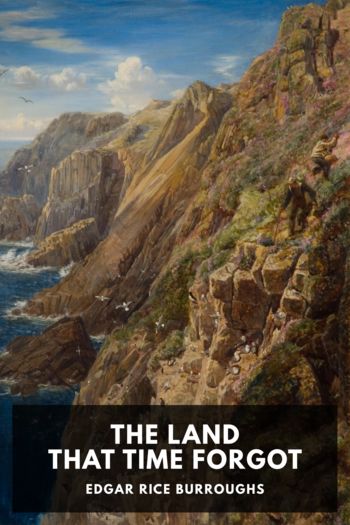The Land That Time Forgot, Edgar Rice Burroughs [books suggested by bill gates TXT] 📗

- Author: Edgar Rice Burroughs
Book online «The Land That Time Forgot, Edgar Rice Burroughs [books suggested by bill gates TXT] 📗». Author Edgar Rice Burroughs
As Bradley gazed upon them in wide-eyed astonishment, he saw plainly that all his intelligence, all his acquired knowledge through years of observation and experience were set at naught by the simple evidence of the fact that stood out glaringly before his eyes—the creatures’ wings were not mechanical devices but as natural appendages, growing from their shoulderblades, as were their arms and legs. He saw, too, that except for their wings the pair bore a strong resemblance to human beings, though fashioned in a most grotesque mold.
As he sat gazing at them, one of the two awoke, separated his wings to release his arms that had been folded across his breast, placed his hands upon the floor, dropped his feet and stood erect. For a moment he stretched his great wings slowly, solemnly blinking his large round eyes. Then his gaze fell upon Bradley. The thin lips drew back tightly against yellow teeth in a grimace that was nothing but hideous. It could not have been termed a smile, and what emotion it registered the Englishman was at a loss to guess. No expression whatever altered the steady gaze of those large, round eyes; there was no color upon the pasty, sunken cheeks. A death’s head grimaced as though a man long dead raised his parchment-covered skull from an old grave.
The creature stood about the height of an average man but appeared much taller from the fact that the joints of his long wings rose fully a foot above his hairless head. The bare arms were long and sinewy, ending in strong, bony hands with clawlike fingers—almost talonlike in their suggestiveness. The white robe was separated in front, revealing skinny legs and the further fact that the thing wore but the single garment, which was of fine, woven cloth. From crown to sole the portions of the body exposed were entirely hairless, and as he noted this, Bradley also noted for the first time the cause of much of the seeming expressionlessness of the creature’s countenance—it had neither eyebrows or lashes. The ears were small and rested flat against the skull, which was noticeably round, though the face was quite flat. The creature had small feet, beautifully arched and plump, but so out of keeping with every other physical attribute it possessed as to appear ridiculous.
After eyeing Bradley for a moment the thing approached him. “Where from?” it asked.
“England,” replied Bradley, as briefly.
“Where is England and what?” pursued the questioner.
“It is a country far from here,” answered the Englishman.
“Are your people cor-sva-jo or cos-ata-lu?”
“I do not understand you,” said Bradley; “and now suppose you answer a few questions. Who are you? What country is this? Why did you bring me here?”
Again the sepulchral grimace. “We are Wieroos—Luata is our father. Caspak is ours. This, our country, is called Oo-oh. We brought you here for (literally) Him Who Speaks for Luata to gaze upon and question. He would know from whence you came and why; but principally if you be cos-ata-lu.”
“And if I am not cos—whatever you call the bloomin’ beast—what of it?”
The Wieroo raised his wings in a very human shrug and waved his bony claws toward the human skulls supporting the ceiling. His gesture was eloquent; but he embellished it by remarking, “And possibly if you are.”
“I’m hungry,” snapped Bradley.
The Wieroo motioned him to one of the doors which he threw open, permitting Bradley to pass out onto another roof on a level lower than that upon which they had landed earlier in the morning. By daylight the city appeared even more remarkable than in the moonlight, though less weird and unreal. The houses of all shapes and sizes were piled about as a child might pile blocks of various forms and colors. He saw now that there were what might be called streets or alleys, but they ran in baffling turns and twists, nor ever reached a destination, always ending in a dead wall where some Wieroo had built a house across them.
Upon each house was a slender column supporting a human skull. Sometimes the columns were at one corner of the roof, sometimes at another, or again they rose from the center or near the center, and the columns were of varying heights, from that of a man to those which rose twenty feet above their roofs. The skulls were, as a rule, painted—blue or white, or in combinations of both colors. The most effective were painted blue with the teeth white and the eye-sockets rimmed with white.
There were other skulls—thousands of them—tens, hundreds of thousands. They rimmed the eaves of every house, they were set in the plaster of the outer walls and at no great distance from where Bradley stood rose a round tower built entirely of human skulls. And the city extended in every direction as far as the Englishman could see.
All about him Wieroos were moving across the roofs or winging through the air. The sad sound of their flapping wings rose and fell like a solemn dirge. Most of them were appareled all in white, like his captors; but others had markings of red or blue or yellow slashed across the front of their robes.
His guide pointed toward a doorway in an alley below them. “Go there and eat,” he commanded, “and then come back. You cannot escape. If any question you, say that you belong to Fosh-bal-soj. There is the way.” And this time he pointed





Comments (0)